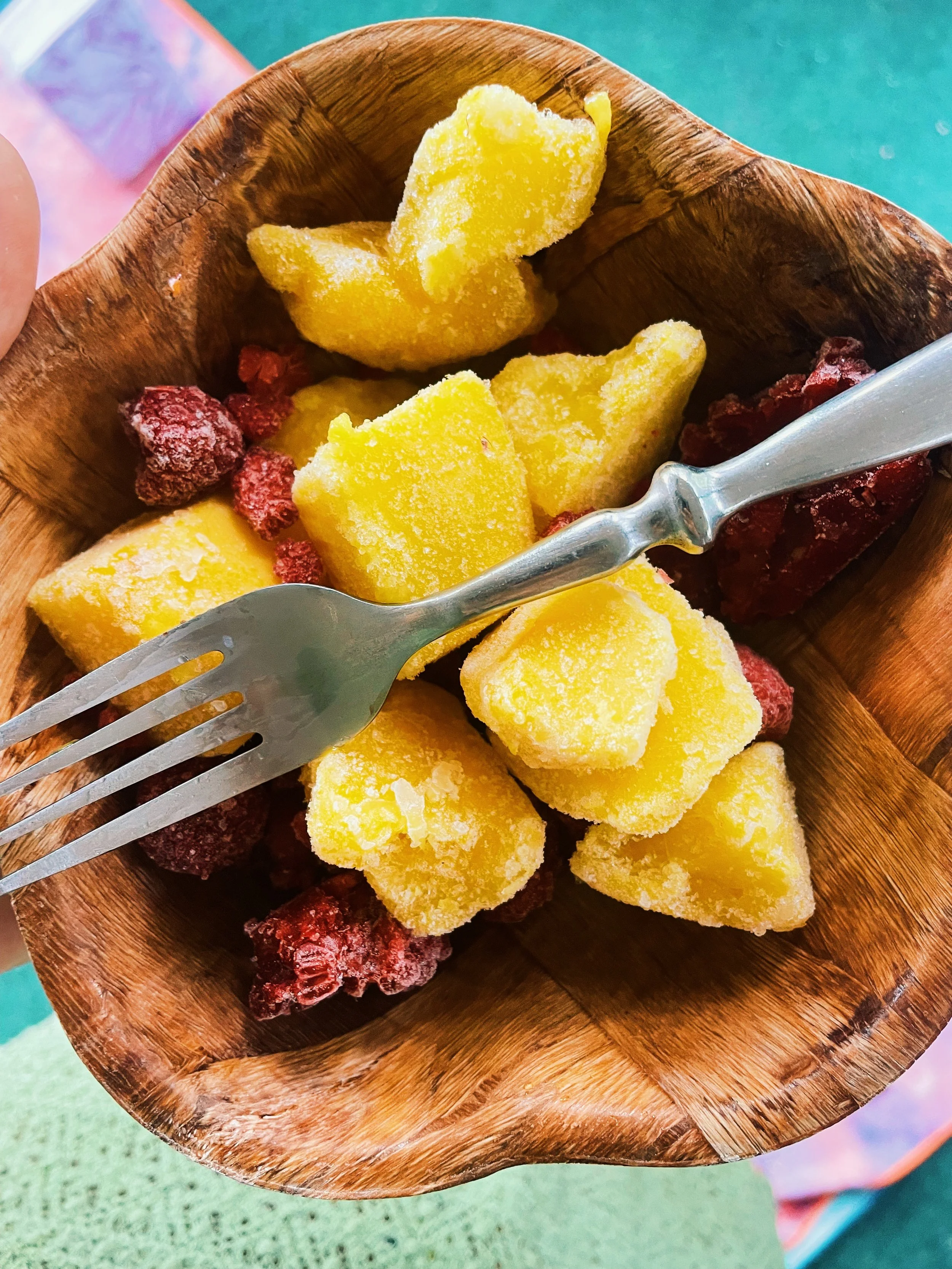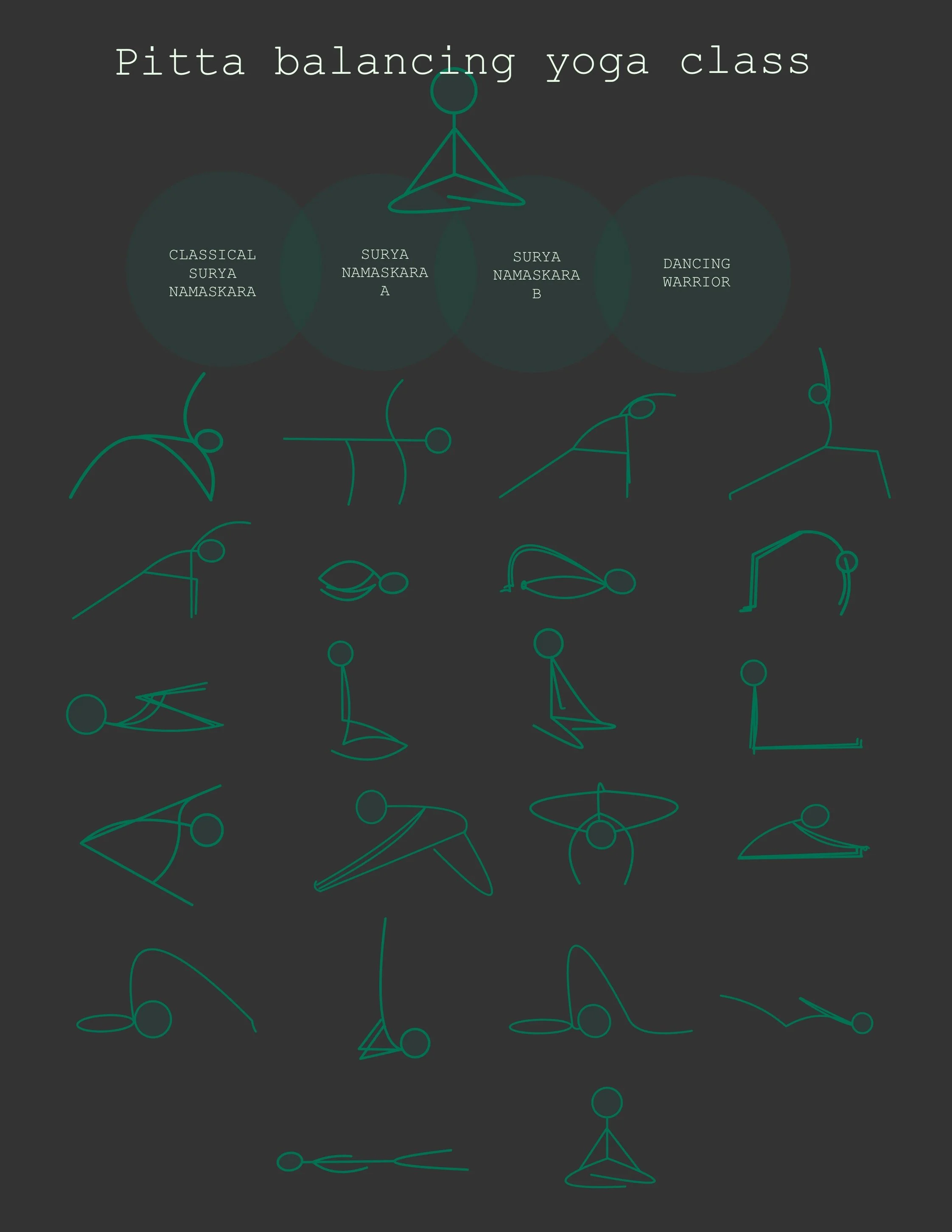Pitta Dinacharya
Pitta Dosha is made up of two of the five elements: fire and water. Fire causes heating in multiple forms in the body, you usually run hot and sweaty. Pitta people are also slightly oily, sharp and fluid. This dosa takes care of all mind and body transformations, like the processing of thoughts, ideas and emotions as well as all inputs from the five senses and food. Pitta is responsible for the process of metabolism and energy production. People with a pitta constitution are usually described as having a well developed physique with muscular limbs, a warm body and aggressive attitude. They are perfectionists as well as being well disciplined to achieve goals and are known for being highly ambitious, confident, courageous and are naturally good at managing many tasks. Pitta individuals should take caution because they are overly ambitious and prone to burning out their energy resources. For these reasons, it is very important for this dosa to take time for relaxation and self care.
To maximize the health of a pitta dosha person in the morning, the following are a few things that will promote that goal. Waking up at least an hour before sunrise is supportive because it aids your sleeping pattern, you want to go to bed early *more on bedtime in the night routine section for pitta*, so your internal clock will set to rise and fall with the sun. As soon as you awaken, brush your teeth and scrape your tongue. If you absolutely need a sip of water before brushing your teeth, then you can do so, otherwise try not to consume anything so you’re not washing the plaque on your teeth down with the drink or food. Once you’ve brushed your teeth, drink two cups of warm water. Warm water is predominant to cold water because the cold will disrupt your inner fire. For Pitta people, you may think that by drinking cold drinks you are calming the fire, but really you are putting it out completely. Everyone needs their inner fire, that’s what helps with digestion and energy production. Warm water is easy for your body to process. Also, when you have an urge for elimination, do not resist the urge. Bowel movements in the morning are essential, you’re getting rid of excess ama (waste) in the body. Nasya with anu oil is of use if you have any kind of congestion or any of the following symptoms listed in the next sentence. The process effectively soothes the nasal passage and clears the sinuses to promote breathing, heals migraines and headaches, and is highly effective in expelling mucus buildup. Performing Abhyanga with pitta balancing oil in the morning every once in a while helps with any dryness, as well as aiding in blood flow. Take a warm shower to wash off any extra oil on the body. Leaving the oil on for longer than half an hour will not provide more time to soak in, it is simply sitting on your pores and clogging them up. The oil will be soaked into your skin after about 15 minutes, you can rinse off then. After completing as many of these rituals as you wish, take a few minutes to an hour or two, sit in a comfortable seat especially for these moments and close your eyes. Meditate if you feel inclined to do so. After closing the eyes, moving your body with your breath during yoga will bring you in tune with yourself and the world around you. It will improve circulation and focus, along with many other benefits. Always take time to relax both mentally and physically, as a pitta person, you are highly ambitious and need to conserve energy.
The middle of the day, from 10am to 2pm, is Pitta time. Pitta governs the time of productivity, this is also the time of day where the sun is at its hottest.
Again, Pitta dosha is made up of fire and water, it is the dosha of heat. This heat can either drive you or beat you down. If you harness the midday heat, you will be propelled to be productive. During this time, stay out of direct sunlight, especially engaging in vigorous physical activity in the sun if you are predominantly pitta. Those with a pitta nature are likely to experience an increase of heat symptoms within the body at this time so staying cool and drinking a good amount of warm water on hot days is essential. Lunch is when you can most indulge in a big meal, as you are best able to digest it at this time, since digestion is a fiery process and will be supported by the heat in the natural world. This meal should comprise of seasonal vegetables, fruits, legumes, salads, lentils, and rice. Avoid overly hot or spicy foods. Always eat slowly as it helps in proper digestion. Do not indulge in talking, watching television, reading or driving while eating. While having lunch, the focus should be entirely on eating so that the body is able to absorb the nutrition properly. After lunch make sure to first sit upright for five minutes and thereafter, take a short walk of 10-15 minutes to help the food to settle down. After that only drink a glass of water as it will calm and soothe the body. For those living near nature, you should walk barefoot in grass or go for a stroll in the forest. The elemental colors of nature; blue, green, brown are said to be pitta pacifying. After finishing off the day’s work, meditate for 5-10 minutes and do breath exercises as it helps to get the mind off of stress and anxiety.
The evening Pitta daily routine after a hard day's work should be light and easy. You should eat a light to moderate dinner that consists of soups and salads. Going to bed with a full belly will disrupt your sleep and cause improper digestion, however, Pitta people specifically can get hungry in the middle of the night which will also disrupt your sleep. Finding a balance between being too hungry or too full is important to bring your awareness to. If you eat an early dinner and feel hungry by the time you go to bed, eat a light snack. Sit quietly for at least five minutes after eating to process your food both in your body and in your mind. Let yourself love the food that you consume because it keeps you going. Have dinner early enough so that there is a gap of two to three hours before bedtime. Take a light walk outside after sitting quietly to help aid digestion and be relaxed and calm. Always avoid heavy exercising after the sunset and instead indulge in reading inspirational books. You can also enjoy a relaxing or warm bath before going to bed, give yourself the option of aromatherapy in the bath. Choose calming aromas like rose, lavender, or jasmine. For pitta people, you should go to bed between 10pm and 11pm. Ayurveda describes sleep as a basic instinct of life, essential to all living beings. We need it to rejuvenate and re-energize our body, mind, and spirit. Sleep is one of the three pillars of life, it is known as nidra, it is detrimental to good health. As a Pitta dosha individual, you may have extra trouble falling asleep if work stress is high or there is too much acid in your diet. For better sleep, a foot massage with warm ghee is recommended. Sleep in a cool, ventilated room and cover yourself with a light blanket. Give yourself at least 8 hours of sleep each night. Finally, right before going to sleep, practice being calm and relaxed. This can be whatever you feel works for you, if that means meditation, yoga, breath work, etc. Cool your fire with loving attention and gratitude throughout your whole day, it will bring deep slumbers and a peaceful mind.
Take your time to get familiar with what works for you, bring one change in at a time. Start with abhyanga, try some breathing exercises, then incorporate yoga and/or meditation. Starting so many new practices can be overwhelming, but we are trying to calm your whole being, so whatever feels like it is helpful, that is what you should be doing. Trial and error is not your enemy. Everything is constantly changing and adapting, be ready for the ebb and flow of life, stay grounded and sure of yourself. Just like we are all different, each of the seasons arrives with its own unique personality too. We can support an improved state of balance throughout the year by making a conscious effort to live in harmony with the cycles of nature and by making small adjustments in our routines in order to accommodate the arrival of each new season. Similarly, if we are dealing with imbalances that do not line up perfectly with our constitutions, it may be helpful to adopt a routine that pacifies the dosha that is most aggravated.

